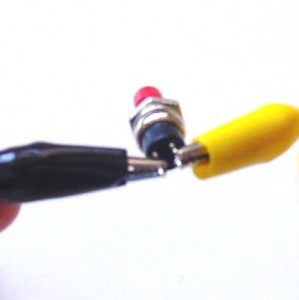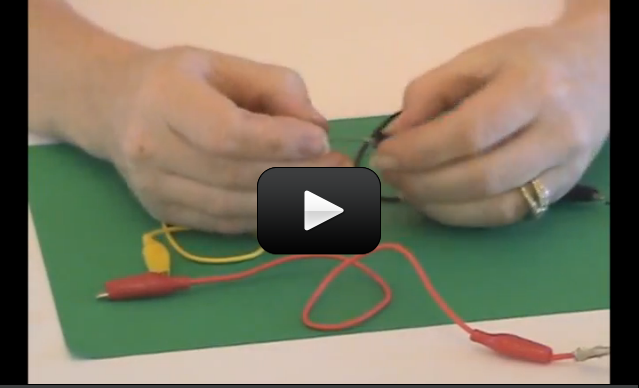 Make yourself a grab bag of fun things to test: copper pieces (nails or pipe pieces), zinc washers, pipe cleaners, Mylar, aluminum foil, pennies, nickels, keys, film canisters, paper clips, load stones (magnetic rock), other rocks, and just about anything else in the back of your desk drawer.
Make yourself a grab bag of fun things to test: copper pieces (nails or pipe pieces), zinc washers, pipe cleaners, Mylar, aluminum foil, pennies, nickels, keys, film canisters, paper clips, load stones (magnetic rock), other rocks, and just about anything else in the back of your desk drawer.
Certain materials conduct electricity better than others. Silver, for example, is one of the best electrical conductors on the planet, followed closely by copper and gold. Most scientists use gold contacts because, unlike silver and copper, gold does not tarnish (oxidize) as easily. Gold is a soft metal and wears away much more easily than others, but since most circuits are built for the short term (less than 50 years of use), the loss of material is unnoticeable.
Please login or register to read the rest of this content.


We are loving this science program!!!! Thank you!!!!
Interesting: In particular the different colored light with the Salt water & D-Battery!
1. Nickel – bright yellow light
2. D-Battery a) Red & Yellow to POS = bright yellow light
b) Red & Yellow to NEG = bright yellow light
c) Yellow to POS, Red to NEG = ORANGE light
d) Red to POS, Yellow to NEG = NO light
3. Wood Rod – no light
4. Water – no light
5. Salt water – weak GREEN light
6. Sugar water – no light
7. Water w/ sugar & salt – no light, BUT particles in water attracted to red clip, bubbles around yellow clip
8. Crazy Aaron’s Thinking Putty – no light
9. Thinking Putty tin – yellow light
10. Cat hair – no light
Yes – conductors (like metals) allow electrons within the metal to flow freely, which allows charge to move across the surface of the object. Insulators (like wood or plastic) will keep the charge where it was placed and doesn’t allow the electrons to flow freely. You can learn more about it here.
so metal is a good conductor of electricity because of certain properties in the metal, but what are the properties? do we know yet?
Technically, yes. If I were you, I’d forget about #1 and 3, because it will really confuse you when you work with electronics and circuits, and focus on the model everyone uses.
So lets see if I have this straight:
1. In reality electricity flows from minus to plus.
2. However, the “current flow” model of electricity says that electricity flows from plus to minus.
3. Yet electrons flow from minus to plus.
Correct?
Hi Samuel – sounds like your results are right on track – great job! What do the #1 and 2’s have in common? 🙂
You are correct about electrons in theory (and this is useful when studying certain aspects of physics), however anytime we work with electrical circuits or electronics, we use the “current flow” model of electricity which says that electricity flows from plus to minus. Trying to do it the other way will make it next to impossible to actually build a working electrical circuit – it’s just too confusing!
We had tried with some things and found:
1.conduct well: sink,doorknob,pencil lead,spoon,pot,knife,faucet,soy milk and salty water.
2. conduct a little:water,salty cucumber.
3. not conducting:plastic,magnet,sugary water,lemon,C.D.,rubber, electric stove coil,cloth and paper.
thank you!
Samuel 8. ( We are not 100% sure about our results, could you verify for us?)
I think electrons flow from minus to plus, but electric currents flow from plus to minus.
Probably because at first they thought they were positive particles moving, but
actually electrons, which are negatively charged, moving.
Jessie
Electricity flows from minus to plus, however when it was first uncovered they picked the wrong direction, so most books follow the old standard of electricity flowing from plus to minus. I believe it was Ben Franklin who first coined it, but I am not positive (no pun intended).
Does the electricity flow from negative to positive, or the other way?
Thank you,
Jacob, 10
Veronica Cable wrote: “Excuse me, the keys do work. Why doesn’t the electricity go through my hand?”
Sounds like you figured out that human tissue does not conduct this level of electricity very efficiently… cool!
Excuse me, the keys do work. Why doesn’t the electricity go through my hand?
I tried some keys but electricity didn’t go through.